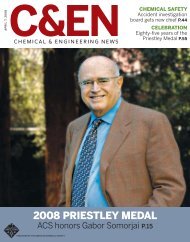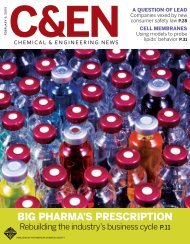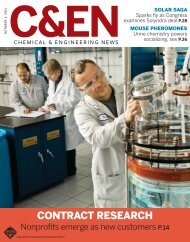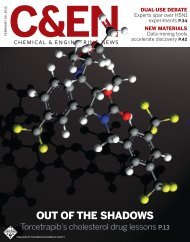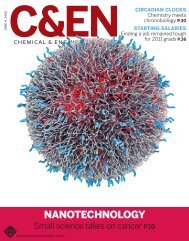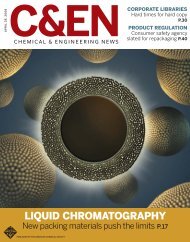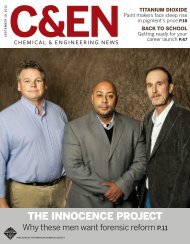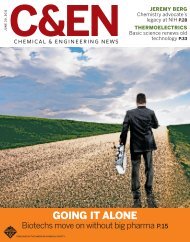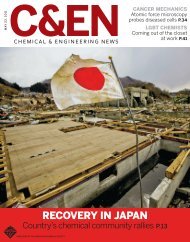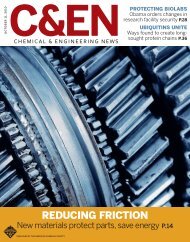February 27, 2012 - IMM@BUCT
February 27, 2012 - IMM@BUCT
February 27, 2012 - IMM@BUCT
You also want an ePaper? Increase the reach of your titles
YUMPU automatically turns print PDFs into web optimized ePapers that Google loves.
plained by simple recourse to physical and<br />
chemical laws alone. Baum finds himself<br />
in disagreement with at least some of what<br />
Polanyi writes but ducks an attempt to reconstruct<br />
the arguments that are involved.<br />
However, a few words on the historical<br />
aspects of the issues involved might be of<br />
some interest.<br />
Polanyi is credited with keeping alive<br />
the idea that there is much more to understanding<br />
biology than a strict reductionism<br />
can provide. In two of his major<br />
works, “Personal Knowledge” and “The<br />
Tacit Dimension,” he wrote of the concept<br />
of emergence, the idea that the structure<br />
and organization of an entity, be it a machine<br />
such as a wristwatch or a biological<br />
cell, exert what philosophers refer to as a<br />
downward causation on the basic physical<br />
and chemical processes that the entity<br />
engages in. The organization and threedimensional<br />
structure of the cell determine<br />
how certain reactions occur, how<br />
components of the cell are transported,<br />
and so on. One can say, then, that while everything<br />
that goes on in the cell is in accord<br />
with the laws of physics and chemistry,<br />
the properties that we think of as cellular<br />
can’t be accounted for simply by supplying<br />
a list of the molecules and their amounts;<br />
they emerge from the cell’s structure and<br />
organization.<br />
Polanyi wrote on these matters near<br />
the end of his career, and in a time when<br />
reductionism was the ideal toward which<br />
science reached. He did not get all the biology<br />
right, and he tilted at some windmills<br />
he might better have left alone. In truth,<br />
his C&EN piece is rather turgidly written<br />
and not always clear. But while he did not<br />
actually invent the notion of emergence,<br />
Polanyi was prophetic in expounding upon<br />
it when he did. In the 1990s, emergence<br />
theory arose to become a significant topic<br />
of discussion in biology and the philosophy<br />
of science.<br />
Theodore L. Brown<br />
Estero , Fla.<br />
IN 40 YEARS of practicing science, I<br />
couldn’t help but confirm my intimate<br />
belief that society is ultimately ruled by<br />
the philosophers and not by scientists and<br />
engineers. Even if we had the firm conviction<br />
that everything in the heavens and on<br />
Earth is reducible to physical interaction<br />
and to the stringent laws of causality, this<br />
wouldn’t be more than a philosophical ideology,<br />
because we have not made the world;<br />
we just discover it and try to fit our gained<br />
LETTERS<br />
knowledge into hypotheses and theories.<br />
For this reason, I stopped criticizing<br />
philosophers on scientific and technical<br />
grounds; this would be equivalent to cutting<br />
the branch of the tree whereupon I<br />
am sitting. Philosophers may, however, be<br />
criticized on philosophical grounds. For<br />
example, someone pretending that every<br />
material process is reducible to physical<br />
causality would have to assume that human<br />
action is also reducible to physical causality<br />
(after all, we are made of atoms). But<br />
assuming this, we can no longer uphold the<br />
concepts of freedom and moral responsibility,<br />
and we cannot justify either to reward<br />
or to punish someone for what he has<br />
done, because everything on Earth would<br />
then be a pure mechanical action-reaction<br />
mechanism, outside the categories of good<br />
and evil, governed solely by the laws of<br />
causality. Denying the transcendence of<br />
life will at the same time deny the inalienable<br />
rights of the human being and the possibility<br />
of a lawful, organized, and civilized<br />
society!<br />
Philosophers such as Michael Polanyi<br />
expressed this early in a terminology that<br />
we should at least try to understand. Biology,<br />
“the science of life,” will, for the philosophical<br />
reasons given above, never be a<br />
molecular science in the deterministiccausal<br />
sense. This affirmation by no means<br />
excludes molecular biology as an integrating<br />
and very helpful part of the science of<br />
life. Similarly, the fact that information<br />
transfer can be tied to deterministic-causal<br />
physical processes (if not, we couldn’t copy<br />
a file onto our hard disk), does not mean<br />
that information is always of deterministiccausal<br />
nature.<br />
It is noteworthy that the (empirically<br />
found!) second principle of thermodynamics<br />
states that the entropy of a closed<br />
system is not bound to any conservation<br />
law, and according to our observation, it is<br />
generally increasing with time. Entropy,<br />
in a mathematical sense, is the logarithm<br />
of the information content of the system.<br />
In other words, according to our empirical<br />
findings, the information content of<br />
a closed system may, and generally does,<br />
increase with time.<br />
As information can be the cause of a<br />
physical process, we must conclude that<br />
there are not only physical but also nonphysical<br />
causes of physical processes. The<br />
second principle of thermodynamics is the<br />
principle of transcendence of life!<br />
Edgar Müller<br />
Prilly , Switzerland<br />
TOKYO ELECTRIC POWER CO.<br />
THIS WEEK<br />
ONLINE<br />
Little Radiation From<br />
Fukushima Reached U.S.<br />
After an earthquake and tsunami struck<br />
Japan’s Fukushima Daiichi nuclear power<br />
plant last March, the plant released<br />
radioactive gases and particulates that<br />
circled the globe. Now scientists estimate<br />
the material boosted soil radioactivity<br />
in the U.S. by on average 3 to 10%.<br />
cenm.ag/env65<br />
Paper Device Monitors<br />
Liver Health<br />
An alarming side effect of many<br />
medications is liver damage, which<br />
if unchecked can cause death. Monitoring<br />
liver damage is a challenge in<br />
developing regions without access to<br />
clinical tools and skilled personnel. Now<br />
researchers have created a cheap device<br />
made of paper to quickly and easily<br />
measure a patient’s liver health without<br />
a hospital’s laboratory tools.<br />
cenm.ag/anl55<br />
Drug Delivery Hooked<br />
On Sugar<br />
In an advance for drug delivery, researchers<br />
have demonstrated that they<br />
can slip large biological molecules inside<br />
cells by tagging them with small molecules<br />
called boronates. The boronates<br />
deliver molecular cargo by reacting with<br />
sugars on the cell surface. The researchers<br />
hope the new delivery method will<br />
aid the development of treatments for<br />
cancer and other diseases.<br />
cenm.ag/bio13<br />
Introducing Fine Line<br />
CENtral Science introduces its newest<br />
blog, Fine Line. C&EN Senior Editor<br />
Rick Mullin covers the fine chemicals<br />
market, keeping you up-to-date on<br />
the latest moves by companies and<br />
changes in industry regulations. In his<br />
first post, he describes the mood at the<br />
Informex meeting in New Orleans after<br />
recent changes in senior management<br />
at several firms.<br />
cenblog.org/fine-line<br />
WWW.CEN-ONLINE.ORG 3 FEBRUARY <strong>27</strong>, <strong>2012</strong>



